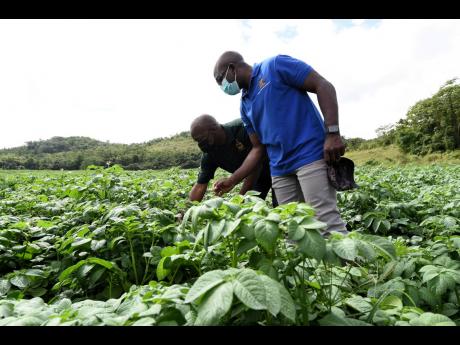When the new RADA comes on stream ...
Minister of Agriculture and Fisheries Pearnel Charles Jr told Tuesday’s meeting of the Standing Finance Committee of Parliament that when the consultancies for the restructuring of the Rural Agricultural Development Authority (RADA) are completed, the organisation will be better positioned and equipped to meet its mandate. He did not give a timeline for the consultancies nor the restructuring, but said it was high on the agenda going into the 2022-2023 fiscal year.
“I think it is $26 million that is committed to the restructuring of that organisation in the initial preliminary phases of the restructuring to get the consultancies and other things done. Once we are able to go through that process, it will allow for us to know exactly what we require in terms of extension officers, services to move RADA into that modern organisation for it to achieve its goal with improvements in efficiency, reducing any waste and really allowing us now to have sustainable growth throughout our country.”
Charles Jr, who was responding to questions from Opposition Spokesman on Agriculture Lothan Cousins, said RADA is also on track for a serious investment in heavy-duty equipment such as tractors.
RADA has been without a chief executive officer since last September when Peter Thompson was seconded to the Jamaica Agricultural Commodities Regulatory Authority and has been plagued with leadership problems since 2012 when Al Powell was axed from the top position and Lenworth Fulton, who succeed him, was fired in 2016, also under controversial circumstances.
Over the years the agency has failed to deliver on its mandate of providing technical assistance relating to agronomical practices such as land husbandry and plant and animal health. In fact, it is viewed more as a benevolent society by many farmers who look to it for handouts in the wake of natural disasters.
Former permanent secretary in the agriculture ministry, Donovan Stanberry, accused farmers of being beggars during a 2013 Gleaner Editors’ Forum when he admitted that the welfare mentality of most farmers was a major contributor to the negative grade they gave the agency.
The reality
“The efficacy of RADA and the ministry, nine times out 10 is judged by the typical farmer out there, by the extent to which they can get a hoe, a machete, a bag of fertiliser, etc. If somebody wants to start a farm, they don’t call and ask for technical help or advice.”
Instead, they usually ask, ‘What can [you] do? Can [we] get a bag of fertiliser and so on and so forth?’” he said. The situation was so bad that it was hampering production, Stanberry pointed out.
“We have to understand the realities that exist. One of the approaches that we are having now is that, alongside the traditional farmer, who will always be there, we have to literally create, in parallel, a new breed of farmers that is more commercially focused.”
Speaking at the same function, Lenworth Fulton, who was then executive director of RADA, said that since its inception, misconceptions about the aims and objectives of RADA had flourished to the point where they had given the agency a bad name.
“We were never developed to give farmers input, and that’s where we get the most battering. There are programmes that will do that ....” he said.
However, in 2016, farmers in Clarendon and St Catherine gave the organisation a failing grade and accused it of being more of a deterrent to agricultural investment than the engine of rural growth and development it was designed to be.
One member of the Northern Clarendon Farmers’ Association indicated that he had lost all faith in RADA.
“Just like how the politician come and give you a promise every five years, RADA comes every few days and gives you promises and build up your hopes,” farmer Darrick Grant said as he addressed a Gleaner Growth Forum hosted at the Long Wharf Farm in Free Town, Clarendon.
“They introduce you to programmes that farmers going to benefit from, all you have to do is get yourselves in groups. Then when we have problems, when we have issues that RADA should be taking care of, we can’t find them.”


